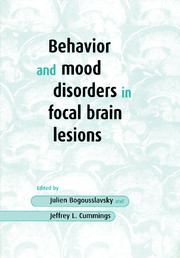Book contents
- Frontmatter
- Dedication
- Contents
- List of contributors
- Preface
- Acknowledgments
- 1 Emotional consequences of focal brain lesions: an overview
- 2 The evaluation of mood and behavior in patients with focal brain lesions
- 3 Methodological issues in studying secondary mood disorders
- 4 Emotional behavior in acute brain lesions
- 5 Depression and lesion location in stroke
- 6 Mood and behavior in disorders of the basal ganglia
- 7 Mania and manic-like disorders
- 8 Behavioral and emotional changes after focal frontal lobe damage
- 9 Disorders of motivation
- 10 Thalamic behavioral syndromes
- 11 Obsessive-compulsive disorders in association with focal brain lesions
- 12 Emotional dysprosody and similar dysfunctions
- 13 Temporal lobe behavioral syndromes
- 14 Neural correlates of violent behavior
- 15 Focal lesions and psychosis
- 16 Alterations in sexual behavior following focal brain injury
- 17 Anosognosia
- 18 Acute confusional states and delirium
- Index
1 - Emotional consequences of focal brain lesions: an overview
Published online by Cambridge University Press: 05 August 2016
- Frontmatter
- Dedication
- Contents
- List of contributors
- Preface
- Acknowledgments
- 1 Emotional consequences of focal brain lesions: an overview
- 2 The evaluation of mood and behavior in patients with focal brain lesions
- 3 Methodological issues in studying secondary mood disorders
- 4 Emotional behavior in acute brain lesions
- 5 Depression and lesion location in stroke
- 6 Mood and behavior in disorders of the basal ganglia
- 7 Mania and manic-like disorders
- 8 Behavioral and emotional changes after focal frontal lobe damage
- 9 Disorders of motivation
- 10 Thalamic behavioral syndromes
- 11 Obsessive-compulsive disorders in association with focal brain lesions
- 12 Emotional dysprosody and similar dysfunctions
- 13 Temporal lobe behavioral syndromes
- 14 Neural correlates of violent behavior
- 15 Focal lesions and psychosis
- 16 Alterations in sexual behavior following focal brain injury
- 17 Anosognosia
- 18 Acute confusional states and delirium
- Index
Summary
Introduction
The brain mediates all cognitive activities and emotional experiences. Cognitive dysfunction following brain injury or associated with brain disease, while still incompletely understood, has been extensively studied. The aphasias, acalculias, and apraxias associated with left hemisphere injury (Levin, Goldstein and Spiers, 1993; Heilman and Gonzalez-Rothi, 1993; Benson and Ardila, 1996), the several types of agnosias associated with unilateral and bilateral brain injury (Bauer, 1993), and the amnestic syndromes associated with hippocampal dysfunction (Bauer, Tobias and Valenstein, 1993) have been the subject of numerous investigations. The emotional consequences of focal brain injury have been much less well researched. The relationships between brain dysfunction and psychosis, depression, mania, anxiety, and paraphelia are in the early phases of pathogenetic study, and more subtle changes in emotional function (such as apathy, irritability, disinhibition, and lability) are also in the initial phases of definition and descriptive linkage to regional brain dysfunction.
Investigation of the emotional correlates of regional brain dysfunction is encumbered by methodological challenges beyond those encountered in studying the relationship between cognitive impairment and brain dysfunction. Emotional disturbances are more influenced by the premorbid personality of the individual, more variable over time, and more difficult to define consistently in research investigations. On the other hand, the emotional consequences of brain dysfunction are a source of enormous distress to the patient and to the patient's family members. They may be more easily impacted through pharmacologic interventions and their importance to patient management cannot be underestimated. The recognition and treatment of these conditions constitute an important dimension of patient care. In addition, a comprehensive understanding of brain—behavior relationships depends on progress in defining the correlations between regional brain dysfunction and human emotion to complement our growing understanding of the relationship of regional brain dysfunction and intellectual disorders. The interaction of emotional and cognitive disorders also warrants study.
Regional brain dysfunction is the focus of interest in this chapter and in this volume. The pitfalls of assessing regional roles in cognition and emotion must be acknowledged. As for cognitive disorders, the occurrence of a deficit or the appearance of new, neuropsychiatric symptoms (e.g., psychosis, depression) in concert with the occurrence of focal brain lesions does not necessarily imply that a particular brain region is uniquely or even primarily involved with that specific cognitive or emotional activity.
- Type
- Chapter
- Information
- Behavior and Mood Disorders in Focal Brain Lesions , pp. 1 - 20Publisher: Cambridge University PressPrint publication year: 2000
- 2
- Cited by



